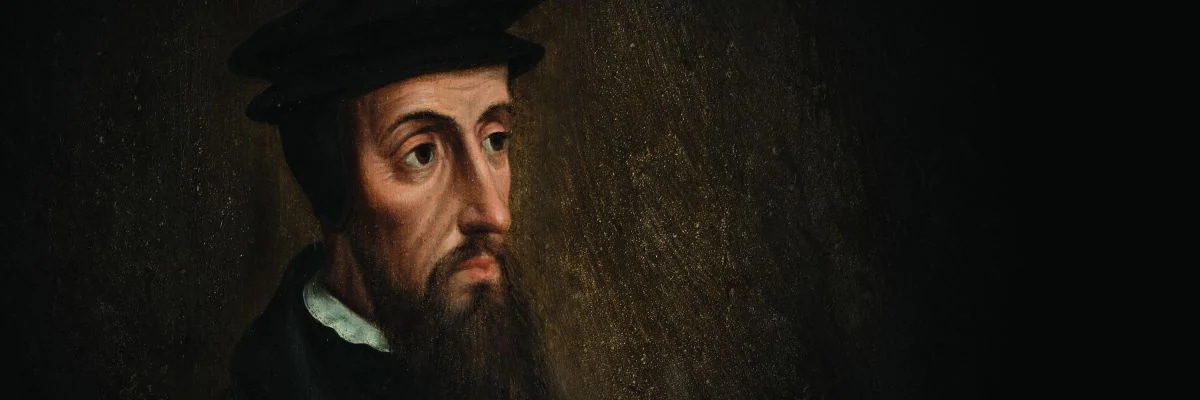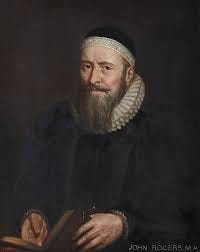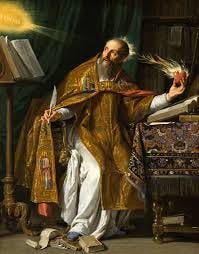As a Student Minister, I field a broad range of theological questions from my students. Coming from middle and high school students, a large portion of them tend to be speculative and theologically peripheral. Questions like: “How old is the earth?” “What happened to the dinosaurs?” “Who were the Nephilim?” Or my personal favorite... “Do you think Adam and Eve had belly buttons?”
I am happy to indulge these questions, and I'm glad they're asking them at all, but what really excites me is when students start asking questions that are more central to the faith. “Why does God allow bad things to happen?” “Why did God put the tree in the garden in the first place?” “Is God the creator of evil?” “What do we make of predestination?” “Is God really sovereign over every aspect of my life, even down to my own choices?”
When engaging these kinds of questions, many people seem surprised when I explain that I am a "Calvinist." If I really want to do a number on someone, I'll even reveal that I would call myself a "5-point Calvinist." When unpacking these ideas, what I've found is that people aren't so surprised by the theology under these labels—namely, a big God who is sovereign over every aspect of the world he has created, including our free actions and our eternal destinies. That kind of theology is, after all, consistent with my regular preaching. I think what surprises most people is merely the fact that I am embracing the title of "Calvinist" itself.
I have encountered many Christians who say things like, "I think of myself as Reformed, but I wouldn't call myself a Calvinist." They seem willing to identify themselves with what they perceive to be a general movement, worldview, or mindset, but unwilling to align with a specific theological position. Setting aside that this statement is historically puzzling, I believe it reveals something significant about the mindset of Evangelical Christianity. In many ways, we have become allergic to doctrinal clarity.
To be fair, there are certain issues where we still welcome clarity. Clarity on matters of primary importance—like the deity of Christ, the authority of Scripture, and justification by faith alone—rarely causes the same recoil as clarity on secondary issues. This is understandable, as clarity on primary issues seldom causes division within the Church. These primary issues, after all, serve as the fundamental markers defining what is and isn't Christianity. However, I've observed that clarity on secondary (yet still vitally important) issues is often viewed not as a virtue in our churches today but as a vice.
I want to make a case for embracing theological labels as a means of achieving doctrinal clarity. As an example of this larger point, I'll explain why I believe "Calvinism" is a helpful label that healthy churches should embrace without any accompanying heartburn.
Richard Rogers, the Puritan pastor of Wethersfield, Essex, at the turn of the sixteenth century, was riding one day with the local lord of the manor, who, after teasing him for some time about his “precisian” ways, asked him what it was that made him so precise. “O sir,” replied Rogers, “I serve a precise God.
1. Calvinism Did Not Originate With John Calvin
I start here because this is perhaps one of the most common objections I hear to embracing the title of "Calvinist." Many Christians, understandably, are wary of embracing a title that contains the name of a particular theologian. Those unfamiliar with church history often assume that Calvinism must be a theological system developed by John Calvin himself. Due to evangelicalism's inherent biblicism1 and skepticism toward non-biblical authorities, people imagine that Calvinism is merely an addition to pure biblical theology. I've heard people say things like, "I don't care what Calvin believed—I believe what Scripture teaches."
While this thinking stems from an admirable desire to hold Scripture as our final authority, it is ultimately shortsighted. Two historical insights are important to keep in mind here.
1. It's true, "Calvinism" came after John Calvin
John Calvin lived from July 10, 1509, to May 27, 1564. As a French theologian, pastor, and reformer during the Protestant Reformation, he profoundly influenced Christian thought. His masterwork, Institutes of the Christian Religion, first appeared in 1536 and grew through several expansions. In Geneva, Calvin emerged as a pivotal figure, shaping both Reformed theology and implementing his vision for a godly society.
That being said, the term "Calvinism" was not used during John Calvin's lifetime, nor was the theological system we know today as Calvinism formalized. In fact, the Five Points of Calvinism2 were not formalized until the spring of 1618 at the Synod of Dort, in response to the followers of Jacobus Arminius, who challenged the general Reformed understanding of God's nature and the doctrine of election that had been embraced by the Reformation. The majority of Reformation theologians did not share Arminius's views, and thus the five points of Calvinism were born.
2. It's also true that the theology behind Calvinism came long before John Calvin
While Calvinism was not formalized as a system until after Calvin's life, the theological impulses and doctrinal categories he espoused have deep roots in history. In fact, we should, in many ways, see Calvinism as the outworking of a more basic theological system known as Augustinianism.
Saint Augustine of Hippo (354–430 AD) was one of the most influential theologians and philosophers in Christian history. He was a bishop, Church Father, and writer whose works shaped the entire course of Western theological thought, particularly in areas of grace, free will, and predestination.
Augustine served as John Calvin's primary theological influence, with much of Calvin's theology traceable to Augustine's writings from the late 300s AD. While much more could be said about the connection between Calvinism and Augustinianism, my key point is this: Calvinism was not a 16th-century innovation. Rather, it was a faithful restatement of theology rooted in both the church fathers and the biblical authors themselves.
2. The Question of Calvinism and Arminianism is Not a Fringe Theological Issue
Secondly, I hear some Christians object to the usage of the term "Calvinism" because they understand the debate between Calvinists and Arminians to be divisive. In their minds, this kind of theological precision has the potential to divide us as brothers and sisters in Christ, and therefore, the benefit of bringing theological clarity to what they consider a fringe issue does not outweigh the cost of fractured unity.
To be sure, the debate concerning Calvinism is historically divisive. This debate represents a fault line that has distinguished entire denominations, traceable back to the church fathers. These people are right to be concerned for unity, but they are wrong in their assessment that this issue is unimportant.
Many Christians may think that the debate between Calvinists and Arminians primarily concerns ivory tower theological and philosophical issues—namely, the questions of human "free will" and "predestination." When taken in isolation, the question "Did God predestine an elect people for salvation, or is salvation conditioned upon human will?" seems to many to have little practical value, especially in our highly pragmatic culture. Things that have little practical value are unimportant, and unimportant things are not worth being divisive over.
Again, while this way of thinking is in some ways virtuous, it is shortsighted. The issues at stake are not fringe. They are central.
Stephen Wellum's Systematic Theology3 is instructive on this point. In his section on the doctrine of God, he discusses the divine decree and issues of Calvinism and Arminianism. Why does this conversation belong in the doctrine of God, as opposed to the doctrine of salvation, you might ask? According to Wellum, it is because the issues in question get at the heart of the very nature of God himself.
We say that God is All-Knowing, but is this knowledge conditioned upon the future free actions of his creatures and therefore ultimately dependent on something outside of himself? We say that God is All-Powerful, but is his power limited by the ultimate self-determining free will of humans? Does God truly declare the end from the beginning? From ancient times the things that are still to come? Or is the future ultimately determined by us?
These are foundational theological questions as they pertain to our doctrine of God. They provide answers to questions like "Who is God? What is he like? What has he done? And how does he relate to creation?" They are anything but fringe, and therefore, I argue that clarity on these issues is of critical importance.
3. Calvinism is a Faithful Tie to Historic Protestant Theology
Lastly, I believe that embracing the label of "Calvinism" is valuable because it connects us to historic Protestant theology. We do not believe that Protestant theology was invented in the 1500s. As Protestants, we trace our roots back ultimately to the church fathers and biblical authors themselves. That being said, Protestant theology was most clearly articulated, developed, and defended during the Protestant Reformation. Therefore, the Reformation provides us with many faithful confessions that summarize our historic faith. Whether we are considering the Westminster Confession, the 1689 London Baptist Confession, the Canons of Dort, the Heidelberg Catechism, the Belgic Confession, or even the 39 Articles of Religion, all of these historic confessions of faith are fundamentally Calvinistic in their theology.
So when a person says "I am a Calvinist," they are saying more than just "I believe in the five points of Calvinism" or "I believe in predestination" or "I don't believe in free will.4" By embracing the title of "Calvinist," a person is aligning themselves with the longstanding theological tradition of historic Christianity. They are saying, "I believe what historic Christian theology has always believed about God, His eternal plan, and His redeeming work in Christ."
This is why many Christians throughout the ages have so enthusiastically aligned themselves with Calvinism. The great preacher Charles Spurgeon once said:
"I have my own private opinion that there is no such thing as preaching Christ and Him crucified, unless we preach what nowadays is called Calvinism. It is a nickname to call it Calvinism; Calvinism is the gospel, and nothing else." - C.H. Spurgeon
I suspect many people would be shocked to hear Spurgeon equating Calvinism with the Gospel, but he does this because he rightly understands that Calvinism is a faithful articulation of timeless truth that we find in Scripture.
Spurgeon, later in the same sermon, said:
"The old truth that Calvin preached, that Augustine preached, that Paul preached, is the truth that I must preach today, or else be false to my conscience and my God." - C.H. Spurgeon
Many other Christians throughout the ages have articulated similar sentiments.
1. B.B. Warfield (1851–1921) – Princeton Theologian
"Calvinism is just religion in its purity. Calvinism is just evangelicalism in its pure and only stable expression."
"The system of doctrine taught by Calvin is just the system of doctrine taught in the Scriptures."
2. J.I. Packer (1926–2020) – Reformed Anglican Theologian
"Calvinism is the consistent endeavor to acknowledge the Creator as the Lord, working all things after the counsel of His will."
"Calvinism is not a different gospel, but simply a more profound exposition of the biblical gospel."
3. Lorraine Boettner (1901–1990) – Reformed Theologian
"Calvinism is the purest and most consistent embodiment of the religion of the Bible."
4. R.C. Sproul (1939–2017) – Reformed Theologian
"Calvinism is not some abstract philosophy—it is the biblical doctrine of God's sovereignty in salvation."
5. John Owen (1616–1683) – Puritan Theologian
"If the Scripture be the Word of God, then Calvinism is the truth of God."
6. Arthur W. Pink (1886–1952) – Reformed Author
"Calvinism is the theology of the Bible in distilled form. It is the theology of sovereign grace."
7. Augustus Toplady (1740–1778) – Author of Rock of Ages
"Calvinism is the Gospel, and the Gospel is Calvinism."
8. Jonathan Edwards (1703–1758) – American Puritan Theologian
"God’s absolute sovereignty and free grace in salvation is the sum of all true divinity."
9. Charles Hodge (1797–1878) – Princeton Theologian
"The system of doctrine known as Calvinism is but the consistent interpretation of the teachings of Holy Scripture."
10. Herman Bavinck (1854–1921) – Dutch Reformed Theologian
"Calvinism is Christianity come to its full strength."
While church history and tradition are not and can never be our final authority, I believe that they are wonderfully helpful guides, and there is safety in finding continuity within historic Christianity.
Thank you for reading. I hope that you have been persuaded that the use of labels for the sake of theological clarity is often a good thing! It is necessary to acknowledge that for many, the term “Calvinism” comes with a certain amount of baggage. Many, unfortunately, have had negative experiences with people who claim to be Calvinists and are turned off to the entire notion of reformed theology and theological precision as a result. This is a shame. We want to be the fragrance of Christ in every environment, and we can do that by being unashamed of, and transformed by, the faith that has been once for all delivered to the saints, for it is the power of God unto salvation for all who would believe.
I hope that next time you find yourself in a spiritual conversation and someone asks you what you believe about God, you'll be able—with a warm smile and a joyful confidence—to say, "I am a Calvinist!"
Biblicism is the belief that the Bible alone is the ultimate and sufficient authority for Christian faith and practice, often emphasizing a literal or plain reading of Scripture without reliance on external theological systems, historical traditions, or creeds
If you’d like a helpful introduction to the “Five Points of Calvinism” Check out R.C Spourls's outstanding teaching series on the subject
It is wrong to say that Calvinists do not believe in “free will”. Calvinists do embrace that we as humans have true volition, but what Calvinists reject is the notion of “libertarian freedom.” Again, Stephen Wellums's Systeatic Theology is very helpful on this point.








Great read!!! So helpful!!
Great read . Really enjoyed this article